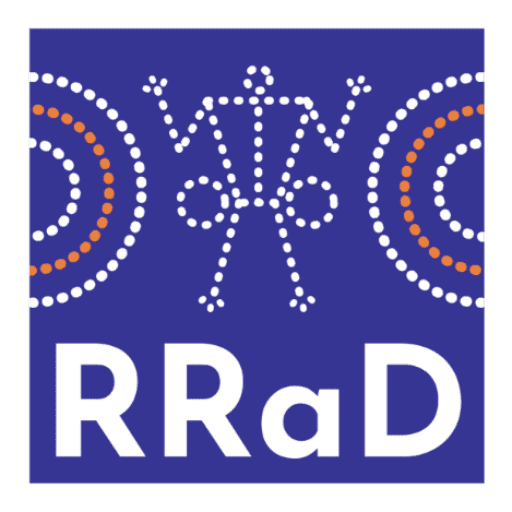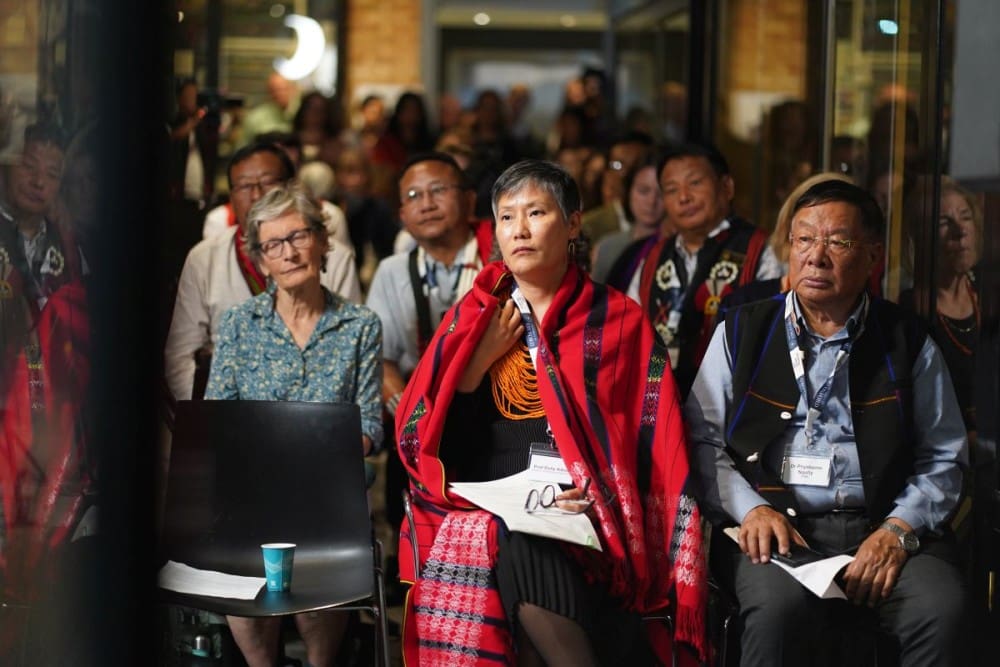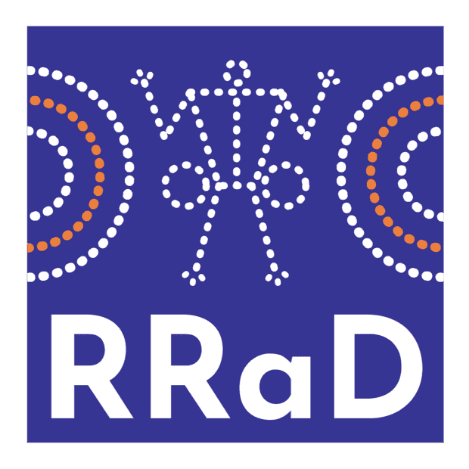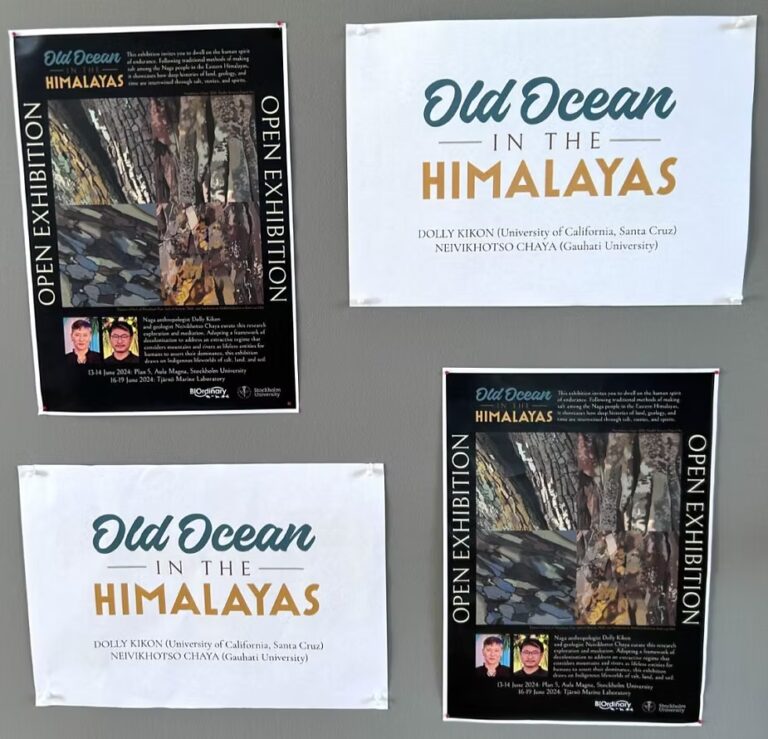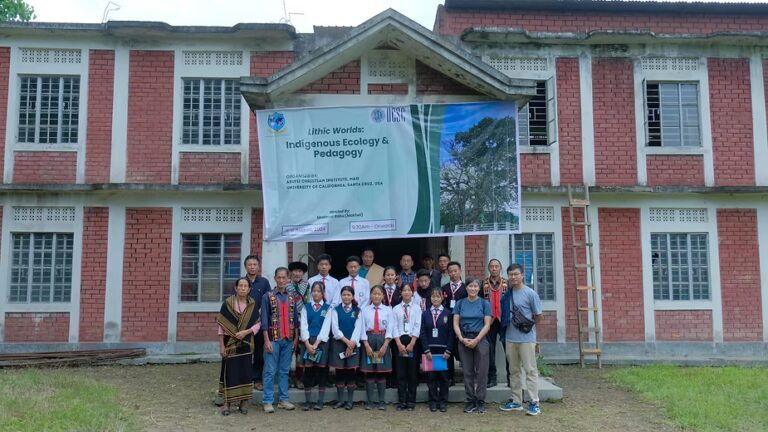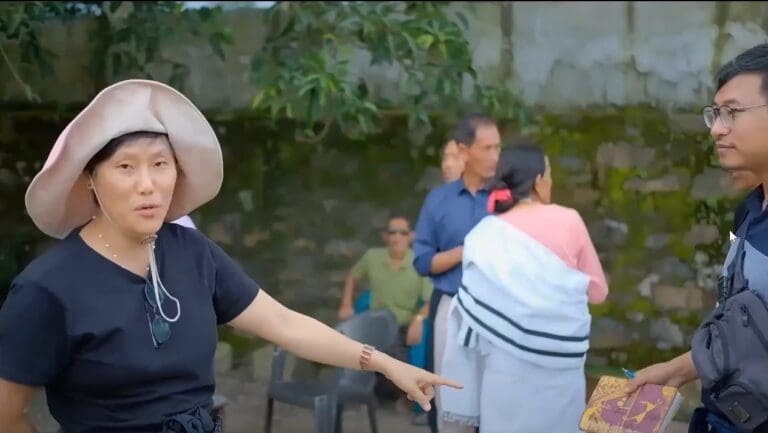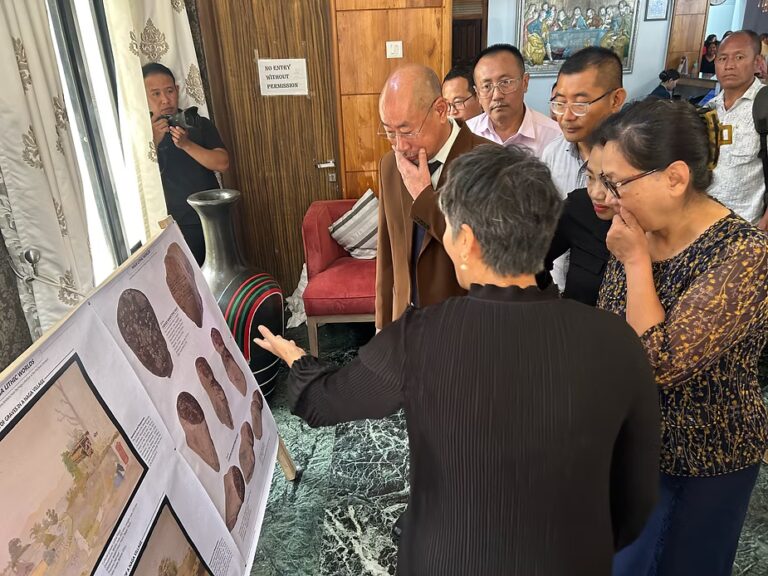Dolly Kikon
I stand here to give the closing reflections for this historic visit of the Naga delegation to the Pitt Rivers Museum.
I see this gathering as a fellowship filled with allies, friends, and mentors who have witnessed our weary journey and our weary tears. Friends and colleagues who believed in our quest for justice and peace, in our vision for repatriation linked with reconciliation.
All Indigenous repatriation journeys underscore the misplaced emphasis on research that focuses on and continues to focus on “studying” communities, and instead commit to new pedagogies that centre on co-learning, co-creation, and, for a change, listening to the Indigenous people shepherding the process.
Through the repatriation process, we are creating a new truth and marching towards the new promises of peace and a shared future.
In the Journey Forward, we call upon museums and educational institutions in the UK and all over the world to stop creating different labels and categories that define humans as inferior and superior. Today, we must leave this place with a conviction to break away from the colonial moulds of defining the past.
We invite you to come together to build the infrastructure of hope, justice, and decolonisation.
This is the way forward for the FNR, the RRaD team, tribal leaders, elders, and the Naga people. It is a difficult path, so we must learn to practice humility, healing, and deep wisdom.
Beloved friends and colleagues, decolonization creates new identities, new movements, and new inclusions. These are the rhythms of our times. These are the rhythms of justice.
What do we feel about our spiritual formations and the life factors that make us dream to live a life of healing and liberation? What is the purpose and beauty of reconciliation?
The journey of Naga repatriation is about addressing these larger questions, and our ancestors are integral to our journey. It is about a collaboration that enhances imagination, moving us towards a shared future and humanising one another.
Yesterday, I stood beside the cabinet where the Naga ancestral remains were displayed at this museum for more than a century. I read the quotations and tried to imagine what it must have felt like for a visitor to look at my ancestors behind the glass cabinets. I was joined by two women who arrived at that spot to read the texts beside me. “Descendants of the human remains? That’s interesting,” one of them remarked. I stood there beside them quietly, feeling a deep sorrow in my heart. I realised how the world must have never connected our ancestors in these cabinets as having once lived a life, or experienced love, family, community, and fellowship.
Did the Naga people forget about them? No, we did not. But you see, we have arrived here as survivors of one of the world’s longest armed conflicts. Since the early 20th century, the Naga world has asserted its Right to Self-Determination and sovereignty, and is currently engaged in political negotiations with the government of India. All long-drawn conflicts lead to deep militarisation and structural violence. All experiences of wars lead to the dispossession of the spirit, vision, and hopes. As the Naga people began to work on peace, reconciliation, and healing, there was a collective calling to introspect and work together to regain the humanity and dignity that had been taken away from us. Once we began the journey of telling our own stories and what hurt and suffering have done to us, we saw our Naga past as tied to this moment of addressing colonial violence, and this moment of recognition and awareness as tied to the future where we hope to experience peace.
Who would have thought of a day when the descendants of ancestors strung on the walls of this museum would travel thousands of kilometres to talk about humanisation?
Who would have thought of a day – since the Pitts Rivers Museum was established in 1884 – that the Naga people would arrive here and reclaim their ancestors and seek joint custodianship of their cultural artefacts?
Since we walked into this museum on Monday (9th June, 2025), the Naga delegation has experienced many extraordinary things. We have been restless in our bodies, we have had strange dreams; some of us have experienced darkness surfacing from our souls, others have been exhausted and suffered bodily pain and breakdowns. This is our collective Naga trauma erupting like volcanoes within the buildings of the Pitt Rivers Museum – an institution whose collections are connected to a dark colonial past of violence, expedition, occupation, war, and death, but is currently working towards redressal, decolonization, and social justice.
Personally, I have felt a force that has guided me through the Naga objects here at this museum. From Naga stone amulets and charms, jewellery made from orchid stems, bamboo agricultural tools, brass gongs, iron spear heads, wooden toys and sculptures, bamboo baskets, and cotton textiles – I felt them all. The history and heritage of my Indigenous world. I felt them come alive with joy and embrace me. I felt them – the hands that created them, touched them, and the hands that took them away and brought them here as “collections”.
The Naga delegation arrived here to start the process of repatriating our ancestors, but their spirits guided us towards all the artefacts from the Naga homeland. The artefacts belong to our ancestors, and they gave us solace this week as we felt emotionally and spiritually unsettled.
This is a historic moment because we gather here – Naga descendants, curators, teachers, leaders, students, activists, artists, and poets – during a challenging time in the world where we must choose love and hope over indifference and violence, we must dare to hope for peace, for a world where we humanise one another.
This is not the time for the Nagas to create an ego for ourselves- this is the call from a people who invite you to create alternatives and strategies centering indigeneity.
The Journey Forward is to free the past from the shackles of people, cultures, and institutions that were entrenched within the walls of colonialism and division.
We are all called to be messengers of engaging with the broken pieces of human and non-human remains from the past, working towards healing the future.
Learning to care for repatriation is learning to care for collective action.
We cannot do everything, but we can do something- we must care for something. We must act, we must participate, we must commit, we must embrace hope.
The Naga repatriation is centered on care and love, and this is always to recognise, respect, and remember the elders who planted this seed of liberation and healing – the journey to rehumanise our ancestors and one another.
We acknowledge all Indigenous elders from around the world who have paved the way for us.
The Naga voice on repatriation is about all human remains still incarcerated within the walls of institutions. They must go back to their peoples to be laid to rest.
What a task. What a revolutionary task we have at hand! Let the Naga repatriation and all repatriation processes around the world bring dignity to ancestors. May they shine on – shine as the beginning of a light, a beacon of knowledge that aligns with humanity, humility, care, healing, courage, liberation, and inclusivity.
Colonialism was a project of division. This is why the core value of repatriation from an Indigenous Naga lens is liberation and work, for there is much work to be done, to advocate for one another. The 21st century is a century of repatriation. Let us celebrate this moment.
Closing Speech of the Naga Delegation at the Pitt Rivers Museum on June 13, 2025.
First published in The Morung Express June 17 2025
